2025 Honda Transalp First Ride Review
The mild-mannered middleweight gets several updates for on/off-road performance.
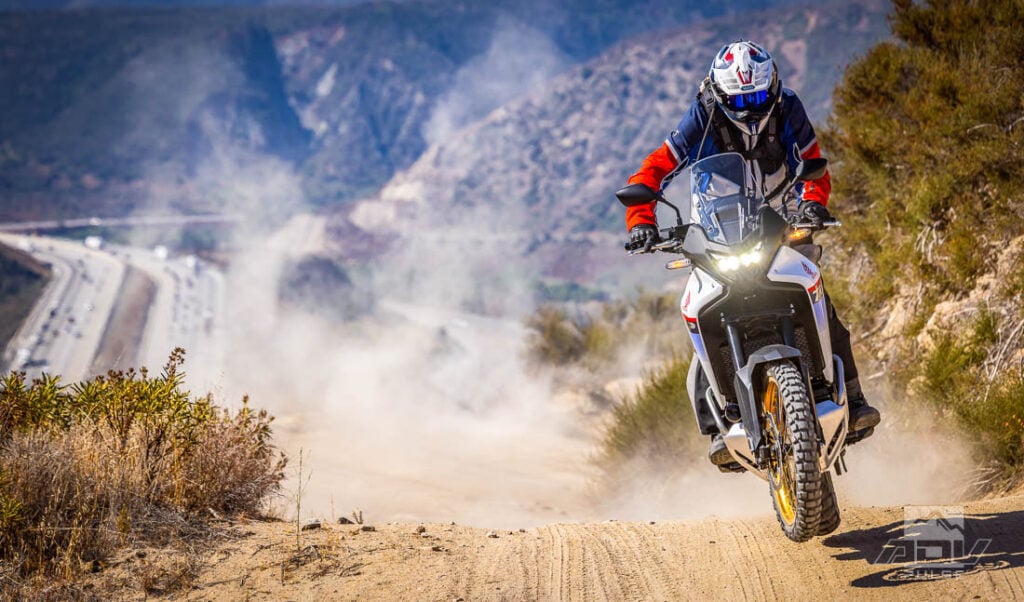
When Honda revived the legendary Transalp name in 2023, it sparked a wave of nostalgia among those who remembered the pioneering adventure bike from the 1980s. By the time the rebooted model landed in the U.S. in 2024, the all-new XL750 Transalp had evolved into a modern middleweight ADV machine—complete with a powerful 755cc parallel twin, a lightweight frame design and a full suite of advanced electronics.
Yet once the nostalgia faded, many riders found themselves underwhelmed, finding the spec sheet conservative and the styling uninspiring—more oversized CB500X than compact Africa Twin. It was, in many ways, a typical Honda: practical, reliable… a bike that just fades into the crowd. Compared to rowdier rivals like the Yamaha Tenere 700 or KTM 890 Adventure R, the Transalp came off as mild-mannered.
Still, testers praised its balanced performance and well-rounded nature. It was relatively light, handled well on and off-road, the price was right, and it hit a sweet spot for riders who wanted capability without the fanfare. Think Toyota 4Runner of the ADV world—dependable, versatile, and built to go the distance.
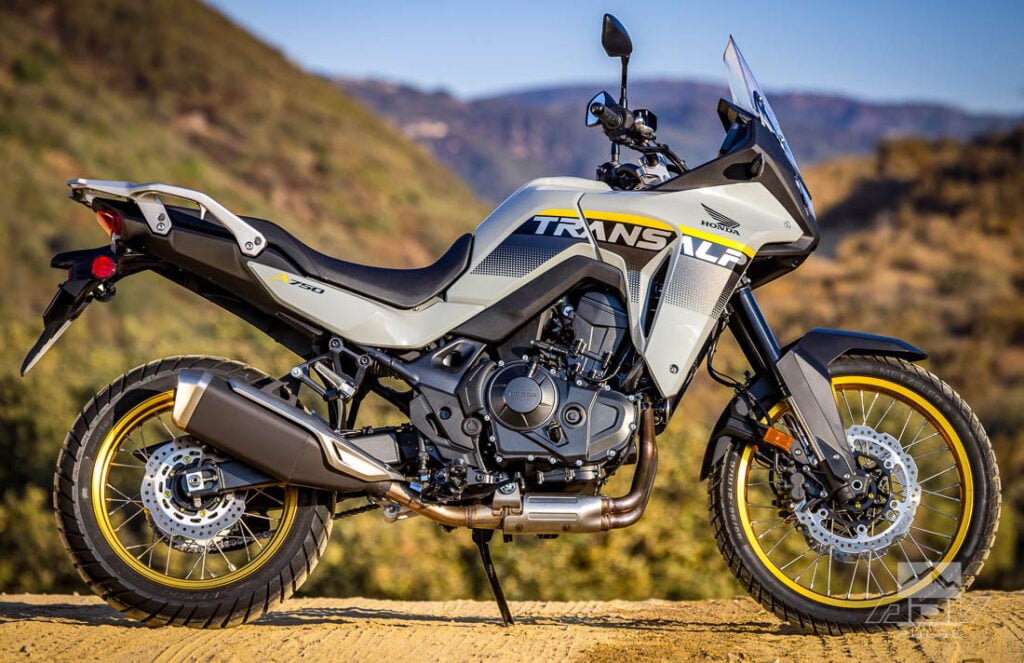
Now, two years later, Honda has returned with a refreshed 2025 Transalp aimed at spicing up the formula. With a sharper look, upgraded tech, and suspension refinements that boost off-road prowess, the new model promises to be more than just a sensible choice—perhaps even a compelling one. Let’s take a look at the changes.
What’s New
Starting with the bodywork, a new windscreen made from high-transparency Durabio is mounted to a revised upper fairing featuring a central intake duct designed to reduce back pressure and helmet buffeting. The refresh also includes a redesigned front end with a more aggressive look that Honda says borrows styling cues from its bigger brother, the Africa Twin. Revisions get rid of the bulkier CB500X-like headlight and introduce more powerful dual LED high/low projector lenses in its place.
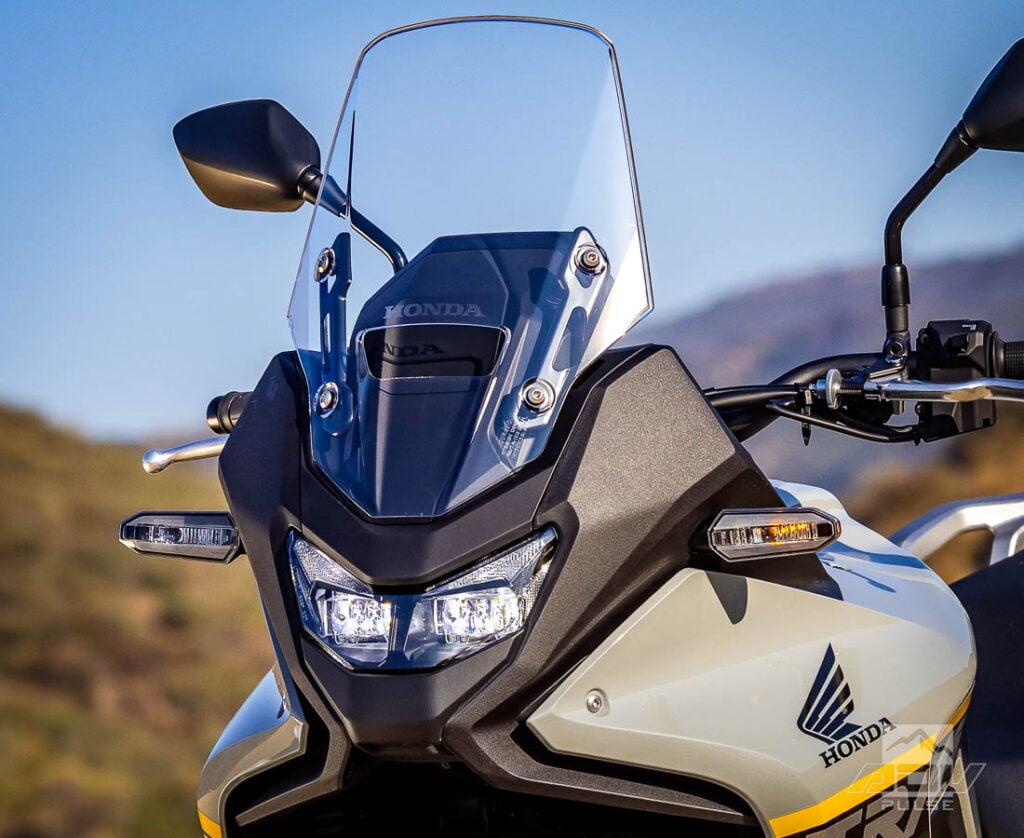
On the dash, a new 5-inch color TFT display with optical bonding technology improves readability in direct sunlight. Riders can choose from three display themes, including a high-contrast black background, and navigate menus using updated switchgear—a simplified, backlit four-way toggle on the left handlebar.

Smartphone connectivity is now available for both iOS and Android via the free Honda RoadSync app. Riders can access turn-by-turn navigation, make calls, or stream music through a Bluetooth helmet headset—all controlled from the handlebar switch.
As for ride modes, the Transalp retains its four default options—Sport, Standard, Rain and Gravel—but adds a second customizable User mode. Now two different User modes let riders fine-tune engine power (4 levels), engine braking (3 levels), ABS (2 levels), and traction control (5 levels), with the option to disable rear ABS and traction control entirely.
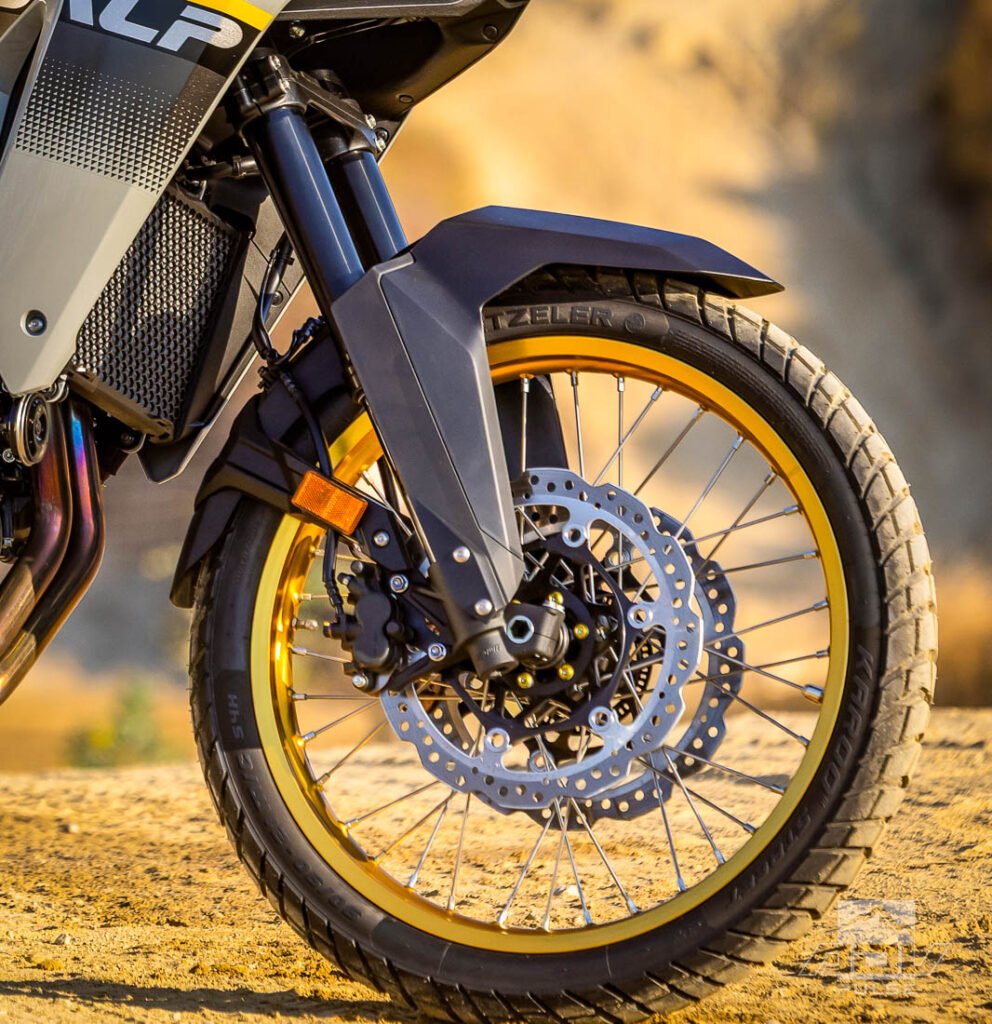

Suspension remains Showa-branded, with a 43mm USD fork offering 7.9 inches of travel along with preload adjustability. Out back, a remote-reservoir shock delivers 7.5 inches of travel through a Honda Pro-Link system. However for 2025, the rear shock receives increased compression and rebound damping for better bump absorption, while the fork is retuned with slightly less rebound and compression for a plusher ride. Seat height stays at an approachable 33.7 inches with 8.3 inches of ground clearance and the bike weighs in about 4 pounds heavier than before at 463 pounds wet.

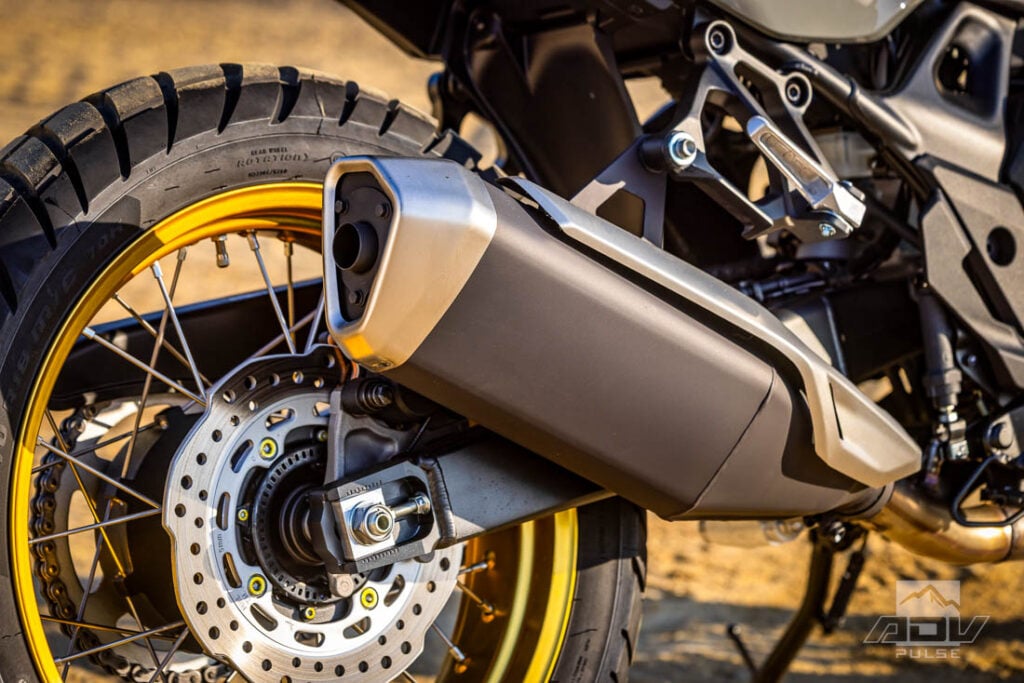
The 755cc parallel-twin engine returns unchanged, featuring a 270º crank and Unicam design inspired by Honda’s CRF motocross lineage. It produces 90.5 horsepower and 55.2 ft-lbs of torque globally, though U.S. models take a 7 HP hit due to sound regulations. A six-speed transmission with a standard slipper clutch and quickshifter rounds out the drivetrain.
Braking is handled by dual two-piston calipers on 310mm front discs and a single-piston caliper on a 256mm rear disc. The 21/18-inch spoked wheels still run tube-type tires—either Metzeler Karoo Street or Dunlop Mixtour—but our test bike was fitted with Bridgestone Adventurecross AX41s for more aggressive off-road grip.
On The Street
Checking out the new Transalp for the first time, I could immediately notice an improvement in the styling. The old aesthetic was Plain Jane, while the new chiseled chin gives the Transalp the jawline of a more performance-oriented adventure bike. The new dash design is clean and easy to read. I also appreciated having a second User mode because now you can set one up for street and the other for dirt.
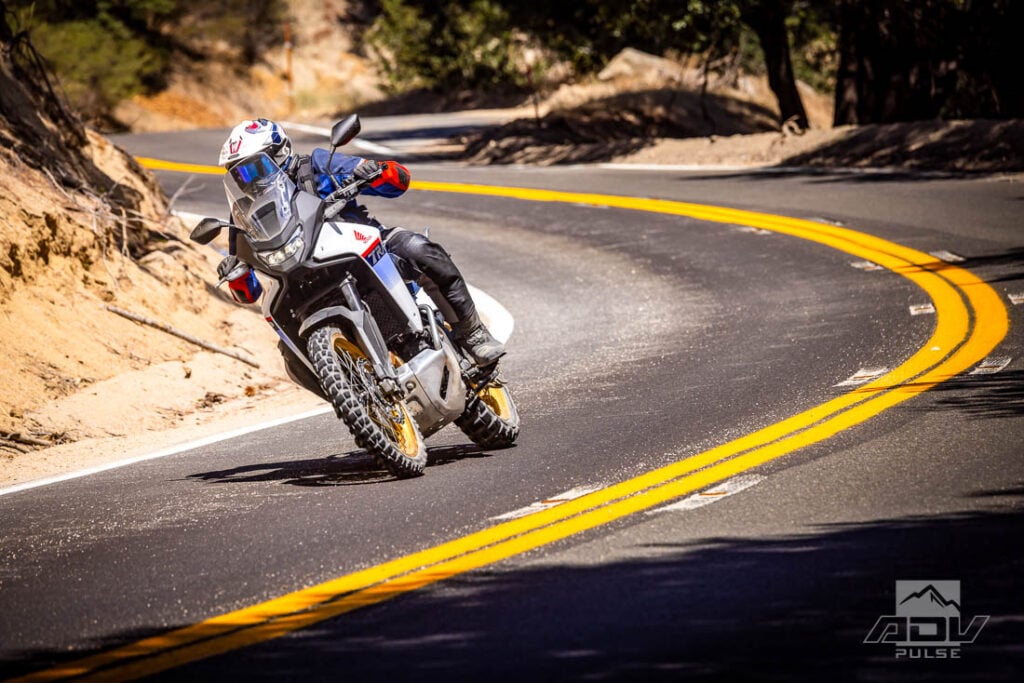
Heading out on the street, I flipped through the modes with the new four-way toggle switch to get a feel for the power characteristics. Going through the standard modes, you can feel progressively more punch in the throttle as you switch from Rain to Standard to Sport. Although, the differences are minor because the Honda makes very smooth power to begin with. Using the quickshifter proved to be quite fun accelerating through the gears and the sound coming from the 270º crank parallel twin is nice on the ears.
The exhaust note encourages you to rev it out with good power for a middleweight but it’s more of a cruiser in character. Getting it up to highway speeds, everything is refined and smooth and it chugs along with plenty of low-down torque to give you instant acceleration when you need it. There’s no problem passing slow-moving cars and the Transalp will quickly get you into the triple digits.
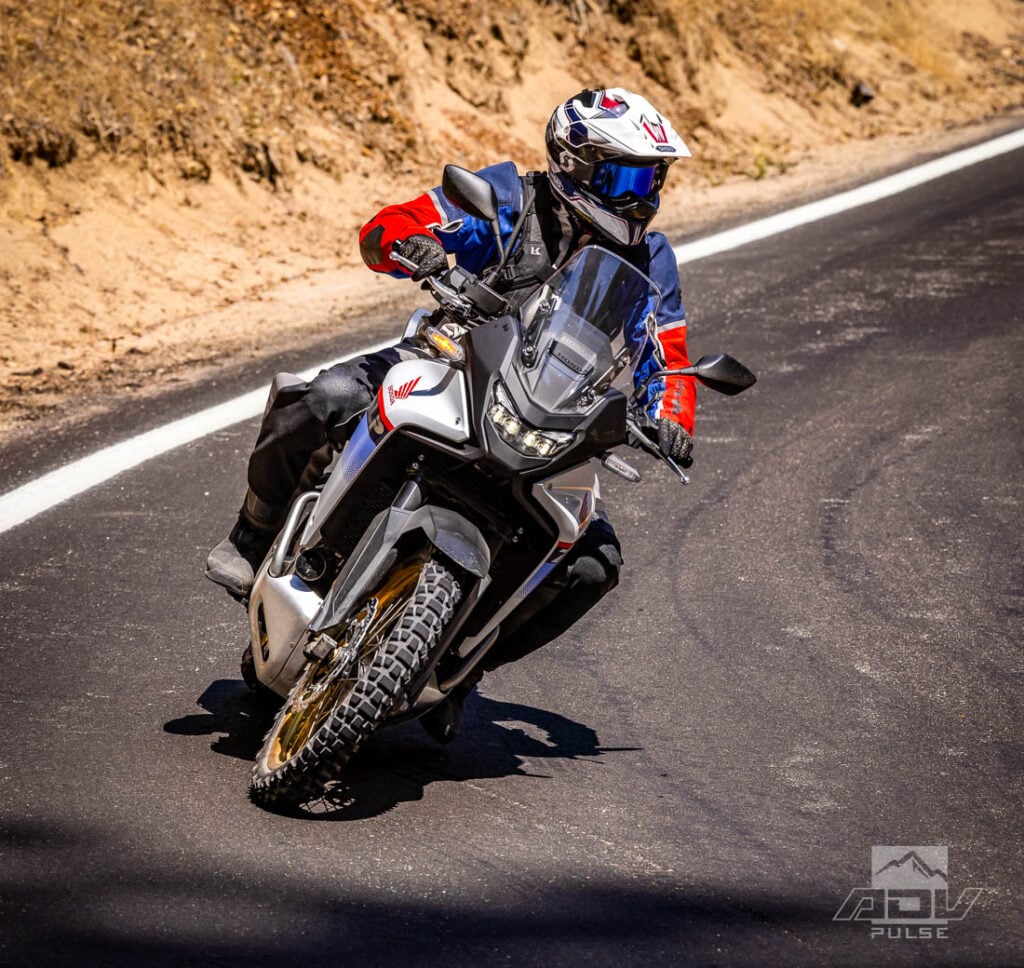
Ergos are cozy for the long haul with a comfortable seat and bar bend. The seat is a tad low but I didn’t feel the knee bend to be excessive for me at 6 foot 2 inches tall. Everything was nice and smooth at the bars and pegs with no vibe cruising down the road at 80 mph. The new windscreen does a good job too, keeping a smooth bubble of wind around your head and upper torso. I don’t remember having a problem with the old version during a previous test but there were definitely enough testers who found the old screen to cause buffeting that Honda felt the need to make a change.
When we pointed the bikes to a curvy section of asphalt, the Transalp felt right at home. It has a relatively light chassis and a planted feel on the front end. There’s good feedback on what the tires are doing and the chunky AX41’s never felt squirrelly. The brakes just plain work, with good power and feel. You only need one finger on the front brake to bring the bike to a fast halt.
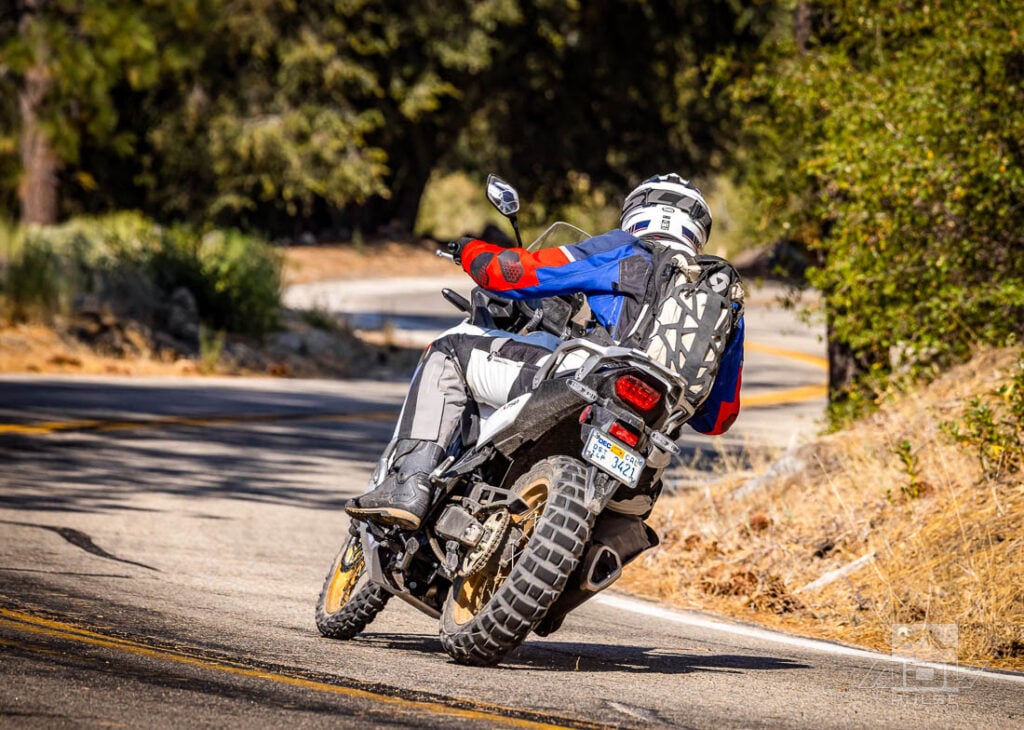
Overall, the bike feels light and flickable in the turns and easily recovers if you hit a rut in the road. I configured the User mode to have full power, the lowest engine braking, and traction control off to get a feel for its aggressiveness. It accelerates hard out on the straights, will wheelie in first and second gear and will even spin the tire a little if you get on it early out of a turn. So much for being mild mannered.
One thing that holds it back a bit in the twisties is its relatively low-slung stance. I found myself scraping toes and pegs rather quickly once I started riding it more aggressively, even when hanging off the bike. Meanwhile, the lead rider on an Africa Twin in front of me, which sits almost two inches higher than the Transalp, had no such issues at similar speeds.
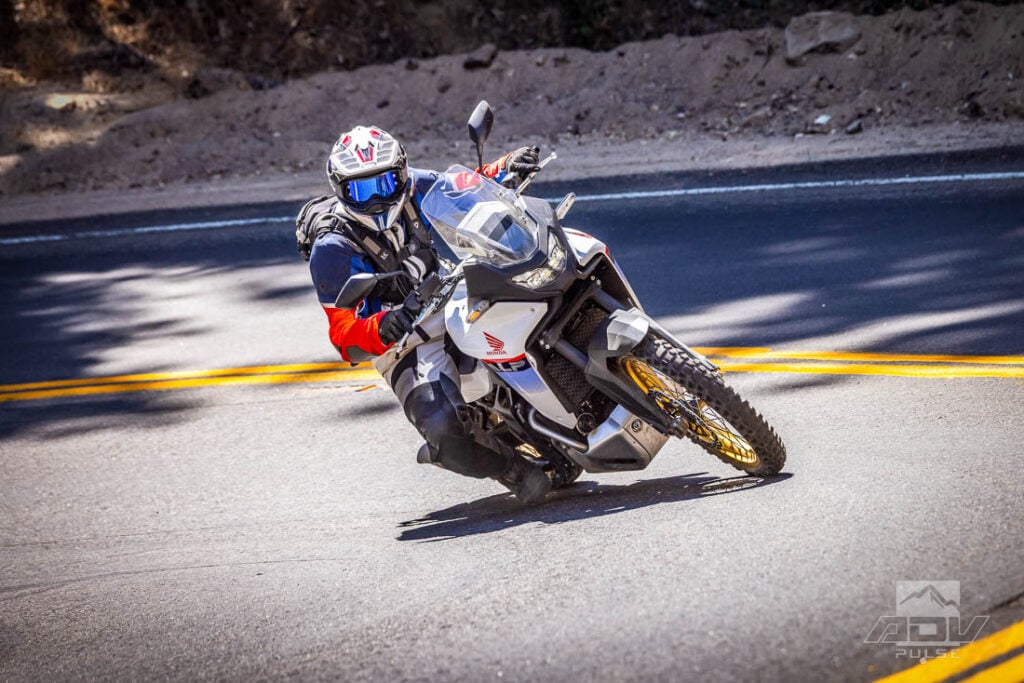
Back to the modes, the interface felt clunky. To switch modes using the ‘up’ button, you first need to roll off the throttle, then wait several seconds for the new mode name to appear on screen. More than once, I got impatient and pressed the button again, unintentionally skipping past my intended selection and having to cycle through all the options again. I later noticed a small icon in the upper left corner changes immediately with the button press, signaling the new mode—though the full mode name only appears at the bottom once it’s fully engaged. Unfortunately, the icons are quite similar, making it difficult to distinguish between modes without squinting. It was a distraction while riding to say the least.
In The Dirt
Jumping on the trail, the Transalp doesn’t feel quite as slim or compact as a Tenere 700 but is a fair bit smaller than a Suzuki V-Strom 800DE or KTM 890 Adventure. The sit down position puts you down “in” the bike with the scooped out seat design rather than “on” it like a traditional enduro, yet I found I still had good feel and control. In addition, the tank looks wide but it’s not so wide that it splays the knees significantly. It’s a good dirt tracker with enough power to break the tire loose easily with smooth control.
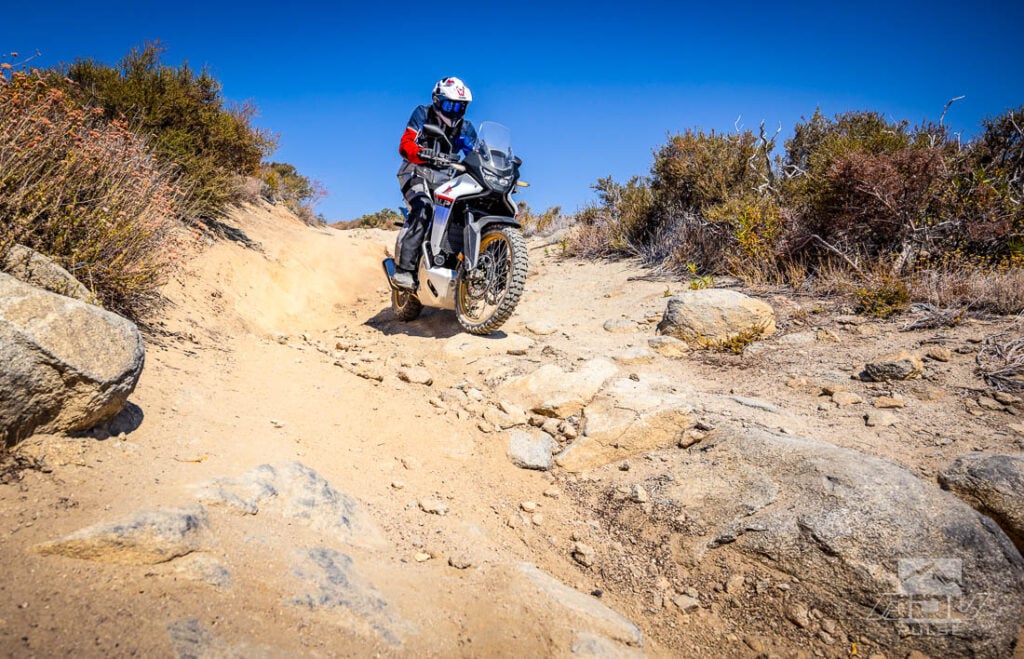
Standing up on the pegs, the easy-going Transalp feels surprisingly enduro-like. Handlebars are at a good height and the pegs are large and grippy with the rubber inserts removed. That same light and nimble handling with good front end feel I noticed on the street, translates to the dirt as well. The bike isn’t that short with a 62.4” wheelbase but something they did in the design of the steering allows it to turn around on a dime. The XL750 doesn’t feel tippy either, so it’s easy to maneuver around at slower speeds.
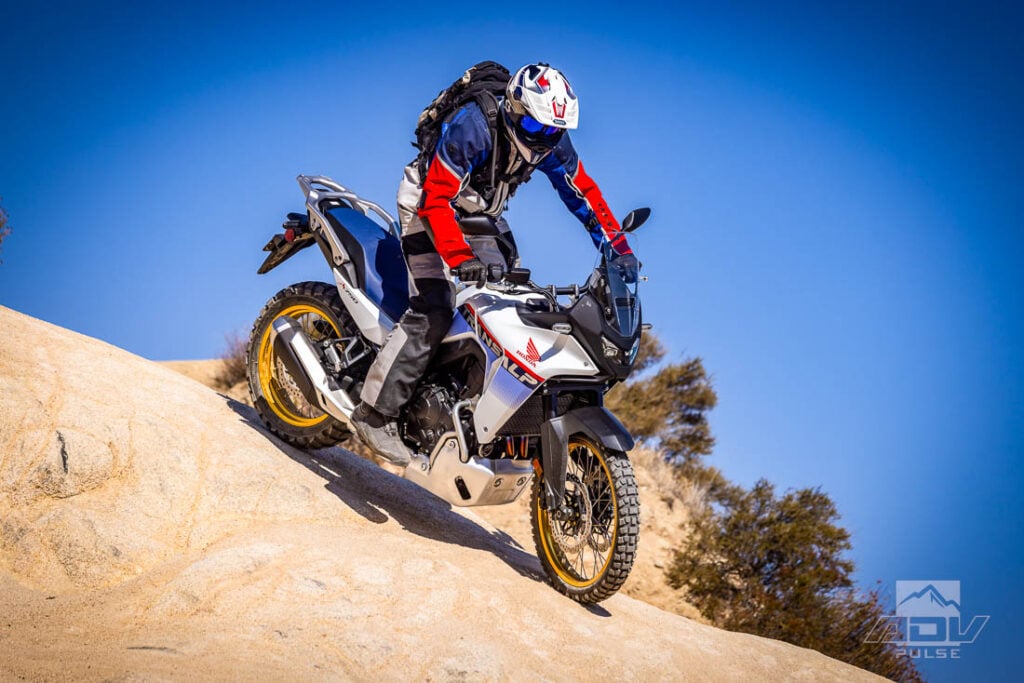
The first trail we hit had some chunky rock sections, which were a perfect test for the new suspension. I definitely noticed the new settings on the front fork, which felt silky smooth over small and medium sized bumps. I would see a rocky spot coming ahead and then brace for it, only to roll over it like it was some type of mirage. The fork plushness has definitely been enhanced with the new valving, making it a more-pleasant mount for all-day exploring on rough roads.
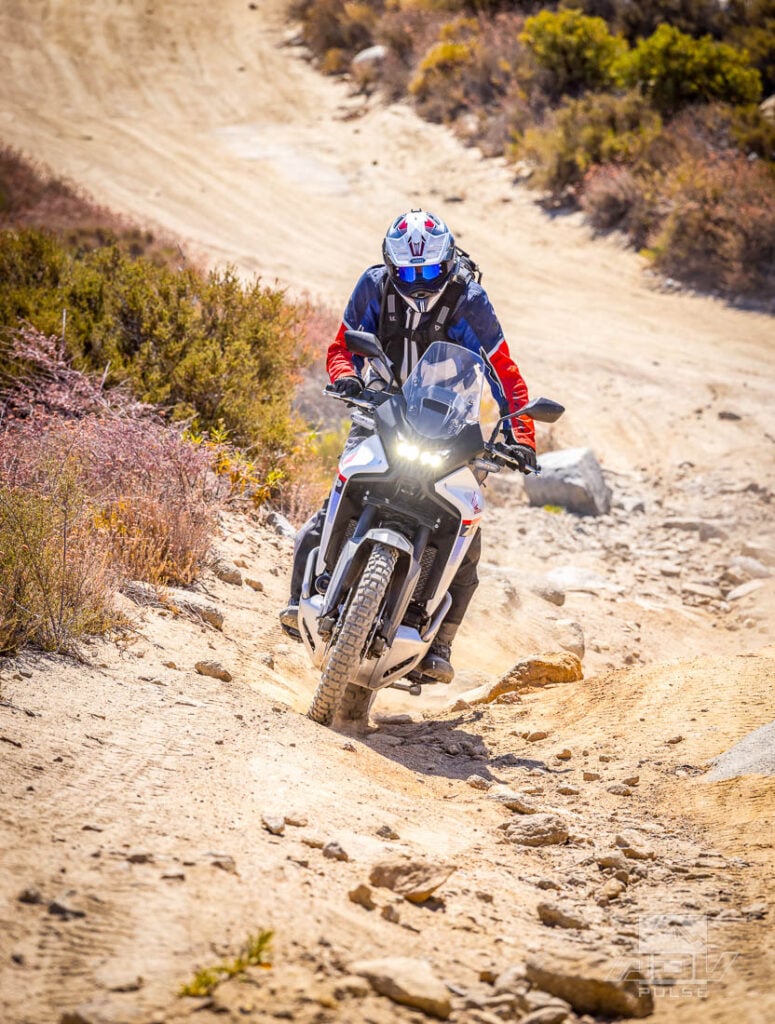
On bigger hits, the fork still bottoms out occasionally but not often enough for me to want to trade the plushness for a stiffer ride. And there were no big clunks like I remember, more of a snap or click noise that lets you know you just pushed it too hard.
Out back, I remember the previous version bottoming out the shock early and often. This time around, it’s been significantly improved, with much better hold up on bigger hits and less-frequent bottom outs. I’m a bigger rider at 210 pounds, so it might not be an issue for lighter riders—but I’d definitely appreciate an extra inch of rear travel. And while they do seem to have dialed in the damping settings front and rear, I’d like to be able to adjust them myself.

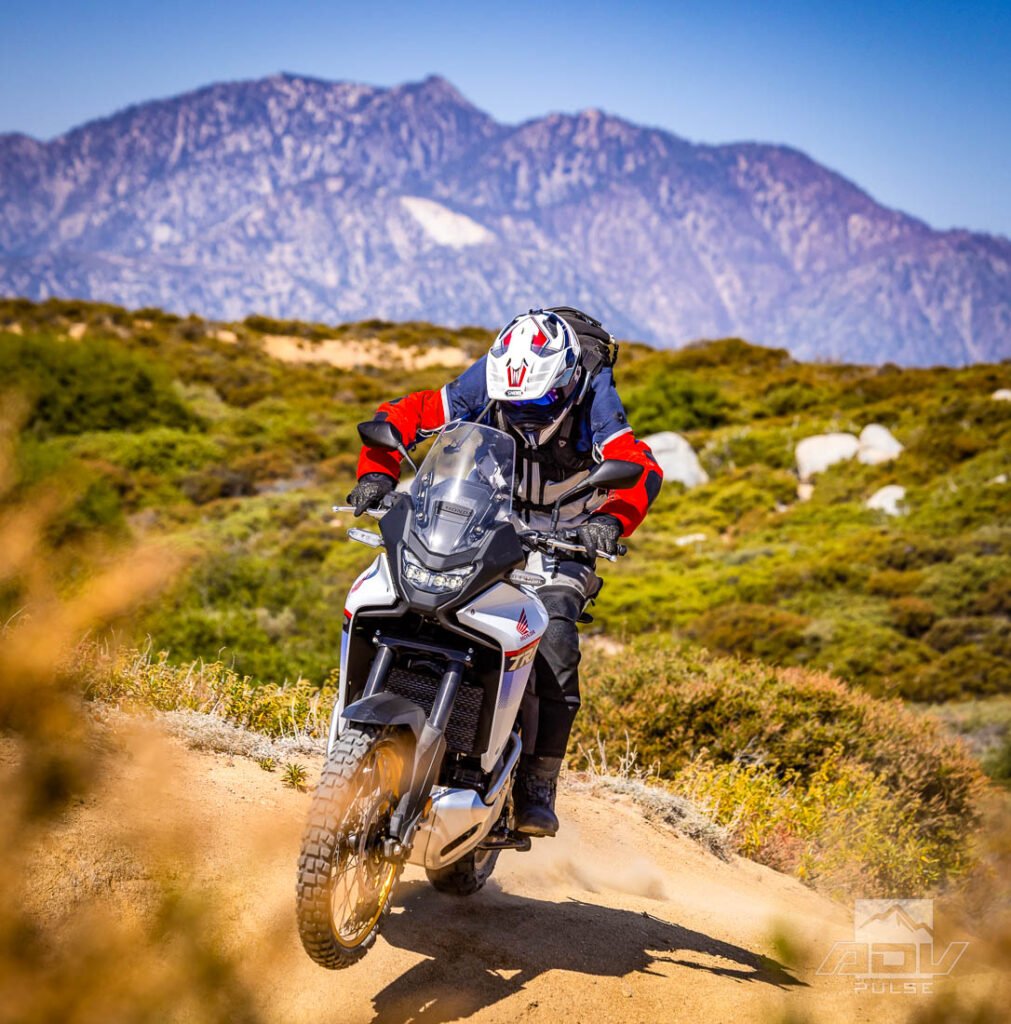
That’s not to say this bike can’t be ridden aggressively though. In fact, it surprised me with how fun it was to ride hard. Its size and mass seem to disappear once you’re pushing it—as long as the bumps don’t get too large. The tractable motor hooks up on loose terrain in technical situations—up until your foot pegs and skid plate start scraping because of the limited ground clearance.
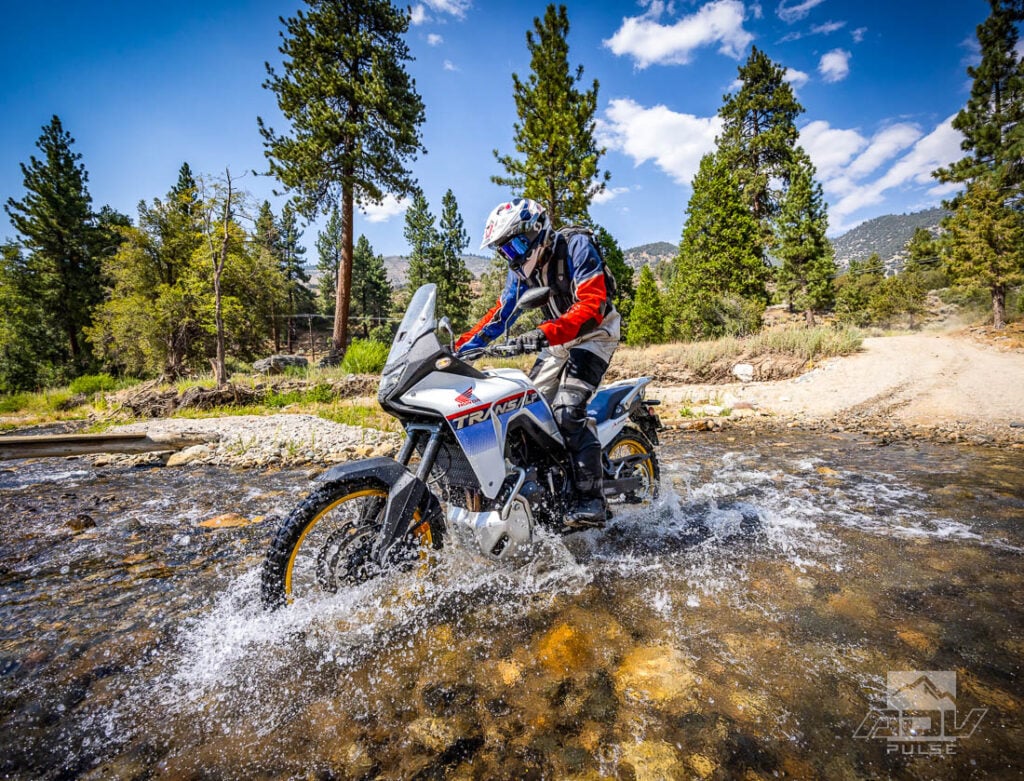
As for the electronics, they definitely fought with me on the trail. First I tried riding it in Gravel mode to see how the pre-configured settings worked. The throttle response was smooth but there was more traction control intrusion than I thought was necessary. I also didn’t like that it keeps the bike in the street ABS mode, activated on both front and rear wheels. That might be fine as sort of a novice off-road mode, but there is no way to turn the ABS off on the rear wheel in Gravel mode. The previous model Transalp did have ABS rear off as default in Gravel mode, so I’m not sure what spurred this change. At a minimum Honda should at least give you the option to turn it off manually.
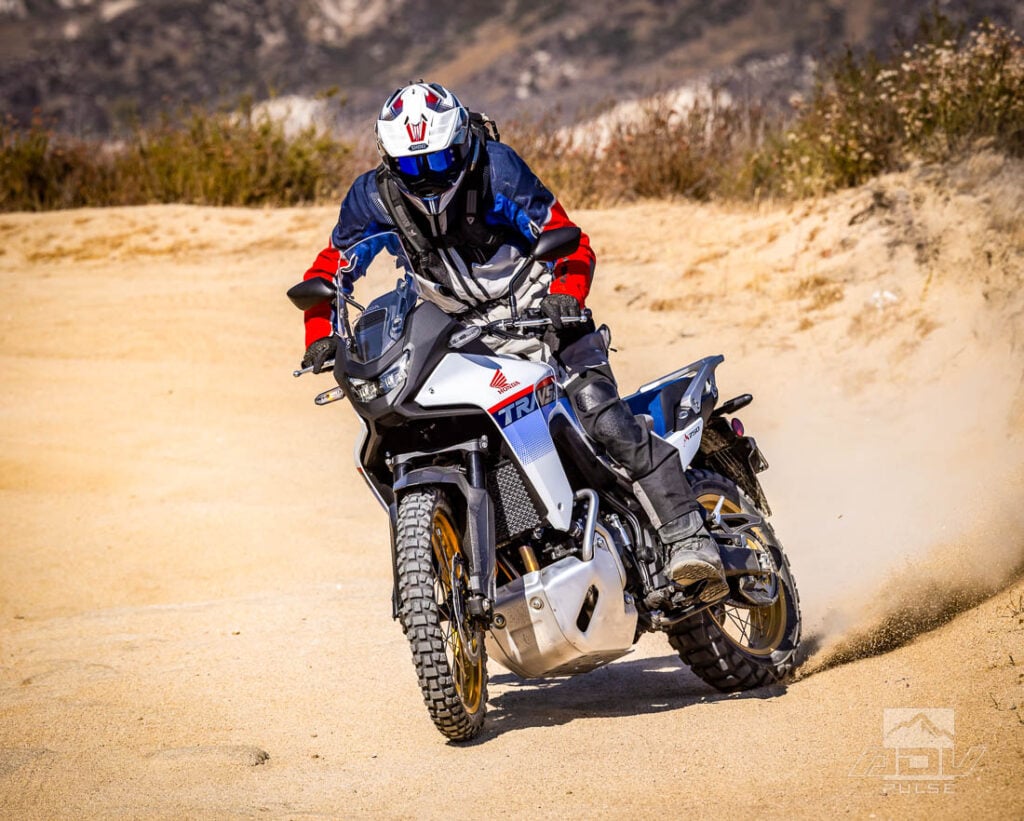
The front-wheel ABS worked well most of the time in the dirt, although I did notice it surging when we got in slippery sections. I also noticed it start to freewheel for a second when I grabbed a fistfull of front brake on a loose downhill section. This typically happens when your front wheel goes airborne for a second and you grab the brake when it’s in the air. Once it hits the ground it takes a second or two to figure out the traction situation. That’s why it’s good to be able to turn front ABS off.
There is no way to turn the front wheel ABS off unfortunately though. You can only turn ABS off on the rear wheel using the User modes, and boy, Honda didn’t make this easy either. After going through several screens to get to the custom settings to turn off rear ABS, you then need to back out through all those screens to get to the home screen. You’d expect ABS to be off at that point, but it requires a long hold on the ‘up’ toggle button to unlock a new menu prompt asking if you really want to cancel ABS on the rear, which you need to confirm. Without these final steps rear ABS stays on.
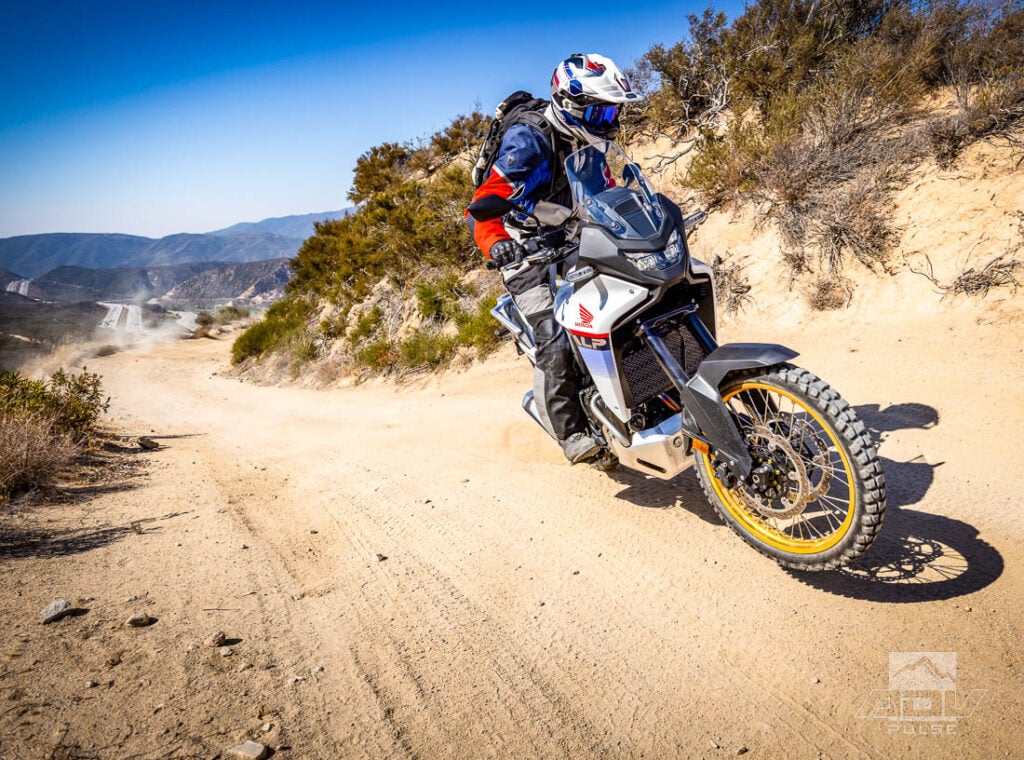
Now I could live with this extra step if ABS stayed off for good in my custom User mode, but if you turn the bike off with the key or kill switch, rear ABS comes back on again after restart. Even worse, if you turned traction control off, it comes back on at the max level. The only way I could get around this was to stall the bike in gear with the key on. Then it would keep my settings once I restarted.
This new implementation of ride modes was frustrating to say the least. Manufacturers have been doing this for more than a decade now. You’d expect these interfaces to get simpler, not harder to use. Honda isn’t alone, I recently rode the new BMW R1300GS and it seems to have taken a step backward in usability for riders who want to turn off settings as well. Manufacturers really need to talk to their lawyers and interface designers to come up with a more streamlined solution that lets us have access to this useful tech when we need it, and not get in the way when we don’t.
The Bottom Line
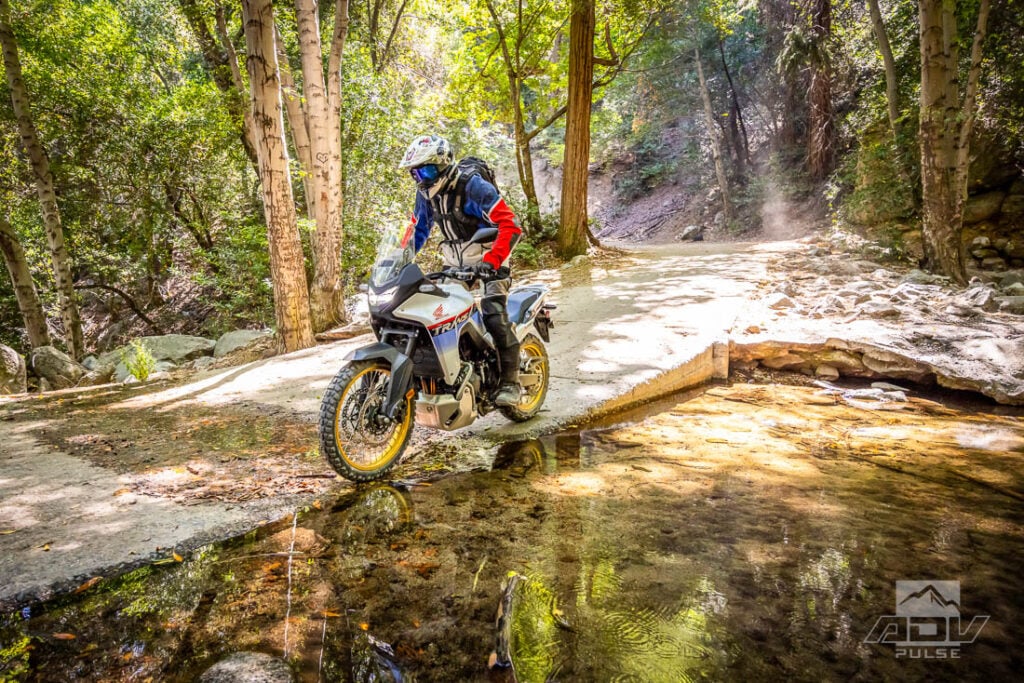
The new Honda Transalp looks a hell of a lot better to me with its revised bodywork and they’ve solved some problems for certain riders who were experiencing buffeting on the highway. The new styling definitely better reflects the off-road capability of the bike, which I think is more balanced now with a plush front end feel and better bump absorption in the rear.
It’s still not the most capable off-roader but I’d say it’s better than a V-Strom 800DE and not far off from the capability of a T7 in the dirt. For me, the engine character, sound and nimble handling make this a great bike. It can be a lot of fun riding aggressively off-road, up to a point. It’s just got some limitations when the bumps start getting bigger, the dips get deeper or the terrain gets rockier. Give this thing a taller, adjustable, aftermarket suspension and it could be a real weapon on the trail. That would also solve the ground clearance problem on twisty asphalt.
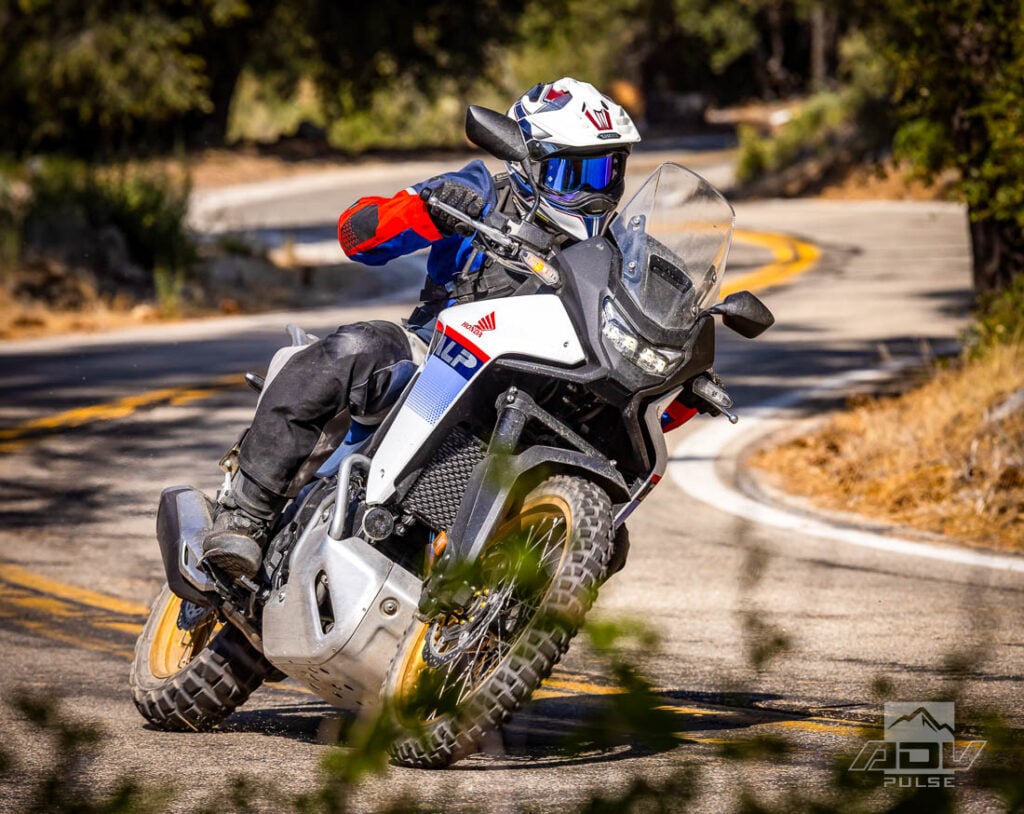
Realistically speaking though, the casual off-road adventure rider is going to be pleased with this bike on the street or dirt. On typical trails in the adventure range, the Transalp is more than capable enough and truly enjoyable to ride. It’s also easy to manage at slower speeds and light enough that you have a chance of picking it up by yourself.
The price tag is a major consideration when evaluating the Transalp and at $9,999 for a bike with this level of performance, built in Japan, that’s a smokin’ deal. Especially considering the extensive suite of electronics, the quickshifter and slipper clutch that are included. Unfortunately, they still don’t have a tubeless wheel or cruise control option, which many potential buyers have been asking for. Perhaps Honda wants you to upgrade to the Africa Twin for that.

Despite the 2025 changes, it’s still the same dependable, friendly Honda middleweight adventure bike it’s always been. If you’ve ever looked at the used market for an old XL600V Transalp from the 80s, you’ll notice they all have at least 30k miles on the clock (typically 40k+). People really enjoy riding these bikes and put the miles on them. This new Transalp is no different. When I wasn’t configuring modes, I really did enjoy riding it too. After a full day of testing about 170 miles both on and off-road, I still felt fresh, the saddle was still comfortable and the noise coming from the tailpipe still made me want to twist the throttle.
2025 XL750 Transalp Specs
| Engine Type: | Liquid-cooled OHC 4-stroke 8-valve Parallel Twin with 270° crank and uni-cam |
| Displacement: | 755 cc |
| Bore x Stroke (mm): | 87 mm x 63.5 mm |
| Compression Ratio: | 11.0:1 |
| Max. Power Output: | 90.5 HP at 9,500 rpm (83 HP for the US version) |
| Max. Torque: | 55.2 ft-lbs at 7,250 rpm |
| Stationary Sound Level (dB): | 95 dB (88dB A2 Version) |
| Max Speed: | 121 mph (195 km/h) |
| Oil Capacity: | 3.9 L |
| Starter: | Electric starter |
| Carburation: | PGM-FI |
| Fuel Tank Capacity: | 4.4 gallons (16.9 L) |
| CO2 Emissions WMTC: | 102 g/km |
| Fuel Consumption: | 54.7 mpg (4.3 L/100km) |
| Battery Type: | AGM |
| Battery Capacity: | 12 V 9.1 Ah |
| Clutch Type: | Wet multiple, Assisted slipper clutch |
| Transmission Type: | 6-speed Manual Transmission |
| Final Drive: | Chain; 16T/45T |
| Frame Type: | Diamond Steel Frame |
| Dimensions (L´W´H): | 91.5″ x 33″ x 57.2″ (2,325 mm x 838 mm x 1,455 mm) |
| Wheelbase: | 61.5″ (1,560 mm) |
| Caster Angle: | 27° |
| Trail: | 4.4″ (111 mm) |
| Seat Height: | 33.7″ (850 mm) |
| Ground Clearance: | 8.3″ (210 mm) |
| Wet Weight: | 463 lbs (210 kg) |
| Turning radius: | 2.6m |
| Suspension Front: | Showa 43 mm SFF-CA USD, 7.9″ (200 mm) travel |
| Suspension Rear: | Monoshock damper, Prolink swingarm, 7.5″ (190 mm) travel |
| Wheels: | Stainless spoke, Aluminium rim, Tube type |
| Tires Front: | 90/90-21M/C 54H |
| Tires Rear: | 150/70R18M/C 70H |
| ABS Type: | Dual-channel ABS (Rear ABS can be deactivated) |
| Front Brakes: | Axial mounted two-piston brake caliper, 310 mm floating double disc |
| Rear Brakes: | Single piston caliper, 256 mm single disc |
| Instruments: | Five-inch TFT Panel Multi information display |
| Headlight: | LED |
| Taillight: | LED |
| Connectivity: | RoadSync |
| USB: | Type – C |
| Auto Turn Signal Cancel: | Yes |
| Security System: | HISS |
| Riding mode: | Sport, Standard, Rain, Gravel, User Mode 1, User Mode 2 |
| HSTC: | Three Level + OFF |
| Additional Features: | ESS |
| MSRP: | $9,999 USD |
Gear We Used
Jacket: REV’IT! Sand 5
Pants: REV’IT! Sand 5
Gloves: REV’IT! Massif
Helmet: Shoei Hornet X2
Goggles: Scott Prospect
Boots: REV’IT! Expedition GTX
Backpack: REV’IT! Barren 18L H2O
Photos by Simon Cudby








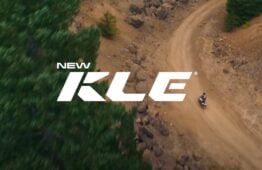
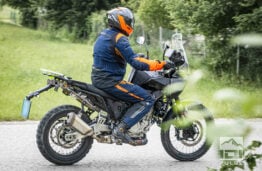
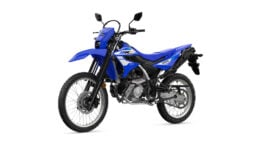
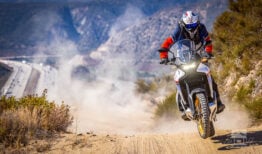


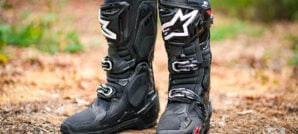
Notify me of new posts via email
I’m a 60 kg male and i think the rear shock of the TransAlp feels like a pogo stick, even in freezing temperatures. So no, lighter riders probably also have an issue with the rear shock.
Is that the new model or the old one? Based on your username, you might be riding it pretty hard too. LOL!
That’s the old one (2024 model). I used to enter some enduros for adventure bikes on my 650 TransAlp but back in 2012 i got disabled.Since then i use my motorcycle for normal everyday use and the occasional simple dirt trail.
I just can’t buy a bike w/ a 7HP penalty. Some riders take the mufflers off their cruisers and nobody stops them. Why should I be penalized for buying a bike that is already quiet? Very sharp looking but this bike is not for experienced riders.
Nice write up Rob. You can see them slowly refining the Transalp which is nice, but it still has more to go it seems. I think you are spot on for this being targeted at the casual off-roader. It would be nice to have a Honda ADV option that is a true off-road weapon. But I just don’t think Honda is up for that, which is unfortunate for riders that like a good tourer, but can really hit the trails hard.
Thanks Dan! Yes, Honda could easily crank it up notch if they wanted to. It seems the aftermarket will have to take care of that. At $10k, riders have some money left over to spend on performance upgrades.
So, in short, they changed the plastics and the display screen and made VERY minor tweaks and added weight. Almost 500lbs. What a joke. Marketing over functionality.
I recently put my 2024 TransAlp on a scale. It showed 204 kg (450lbs) with 13 liters of fuel. My old 650 TransAlp showed 208 kg (458lbs) on the scale with almost a full tank of fuel.
So if I read that correctly, no tubeless tires/rims, no cruise control, clunky mode settings that revert to the nanny state, no compression or rebound adjusters, and less than 5 gallon fuel capacity? Glad to see incremental improvements, but at this rate it’ll be perfect in about 20 years.
Exactly what I was thinking!! Clearly target customer is light off-road/gravel rider. Would be great if Honda recognized the need for a “real” off-road ADV bike someday. Even the AT is not on par with the competition, and especially with the chaos of the KTM group, plenty of market opportunity. Do love my Tuareg but have been dealing with all the warranty issues of a firs time platform. Hopefully got it sorted, as the bike is awesome!!
If I was looking for a new ADV bike I’d definitely give this a hard look. However, I think I’ll stick with my original ’89 Transalp with 56k miles and many Moab and Baja trips behind it.
I don’t need thrills, I need to get to the top of the hill, and then the next one, and then the next one, …
I suppose I will never understand why more motorcycle manufacturers fail to offer upgrades such as a tubeless wheelset, cruise control, heated grips & seat, etc. as extra-cost options.